News & Media
The legacy of Neville Alexander
On 23 October 2019, Unisa once again had the opportunity to celebrate the life of Neville Alexander. The 7th Annual Neville Alexander Memorial Lecture at the Unisa Cape Town Campus was hosted by Prof Mandla Makhanya, Unisa's Principal and Vice-Chancellor, who also delivered the welcome address.
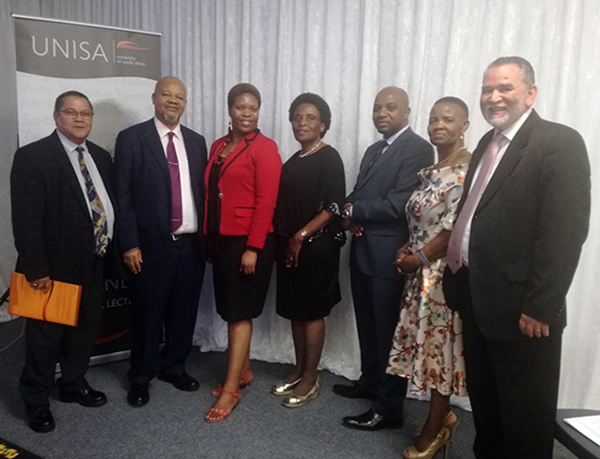
From left: Prof Andrew Phillips, Prof Mandla Makhanya, Ms Xolisa Guzula, Prof Koliswa Moropa, Mr Sakhi Simelane, Ms Moipone Malalesa & Dr Keith Jacobs
This year the focus of the lecture was on the legacy of Alexander with specific reference to bi or multilingual education. His story was told by Xolisa Guzula, a lecturer at the University of Cape Town, and also a friend and colleague of Alexander. She shared the story of a humble leader who made indelible footprints in the South African language landscape.
He was a man who did pioneering work in the field of language policy and planning in South Africa via organisations such as the National Language Project, the Project for the Study of Alternative Education in South Africa (PRAESA), as well as the Language Plan Task Group (LANGTAG). Alexander was a man who was in touch with those around him; a man who played with children and picnicked with colleagues and friends.
Neville Alexander believed in working in a collective – as a team. This is borne out in the many "teams" he created or joined: the South African Committee for Higher Education (SACHED), the National Language Project, PRAESA, the Pan South African Language Board (PanSALB), the Western Cape Language Committee, the XhosAfrika Network and the African Academy of Languages (ACALAN).
He believed in mother-tongue-based bilingual education, with building a firm foundation in the mother tongue first, then adding English as a second medium of instruction by gradually phasing it in.
Guzula took the audience on a guided tour of Alexander’s approach to putting language policy in practice. She shared his vision of teacher training, his views on the onsite mentorship of teachers, his contribution to the development of materials and his passion for community engagement, which started during his years on Robben Island.
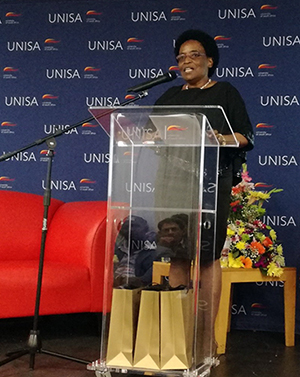
Prof Koliswa Moropa, Head of Unisa's Language Unit
In her response, Prof Koliswa Moropa, Head of Unisa’s Language Unit, focused on two aspects of Alexander’s legacy, namely the development of a culture of reading in African Languages as advocated for by Alexander and his support for language transformation in higher education.
Alexander was instrumental in PRAESA, in partnership with Times Media, establishing a national reading-for-enjoyment campaign Nal’ibali. Nal’ibali has grown from humble beginnings to spread its wings across South Africa and being published in seven language combinations. According to data analysis in July 2019, it is estimated that Nal’ibali achieved a mass media reach of approximately 31 million people during the period under review.
Nal’ibali also distributed supplements and other content via print media publications with a total circulation of 694 880. This included four Tiso Blackstar publications, four corporate magazines and six community newspapers.
Alexander’s view of language transformation in higher education was that "until and unless we are able to use the indigenous languages of South Africa as languages of tuition at the tertiary level, our educational system will continue to be skewed in favour of an English-knowing elite."
Moropa also recognised that Unisa, as an institution of higher learning, is aware that language continues to be a barrier to access and success in higher education. Therefore, Unisa has implemented some initiatives to address the issue, such as adopting a multilingual approach of producing glossaries as learning aids that can assist students.
Mr Sakhi Simelane, Chairperson of Unisa Council, explained why Unisa honours Dr Neville Alexander in the context of his contribution to a multilingual South Africa.
Blaq Pearl aka Janine van Rooy, well-known activist, poet and artist from Cape Town entertained the audience with two solo performances introducing her personal view on the history of activism in South Africa
Dr Keith Jacobs, Regional Director of Unisa in the Western Cape, acted as master of ceremonies and Prof Andrew Phillips, Acting Registrar, concluded the evening with a vote of thanks.
* By Francois Louw, Communications Manager, Unisa Western Cape
Publish date: 2019-11-28 00:00:00.0

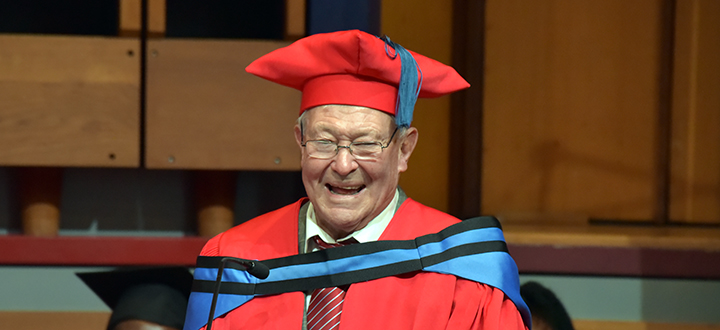 Community champion and agricultural entrepreneur extraordinaire honoured by Unisa
Community champion and agricultural entrepreneur extraordinaire honoured by Unisa
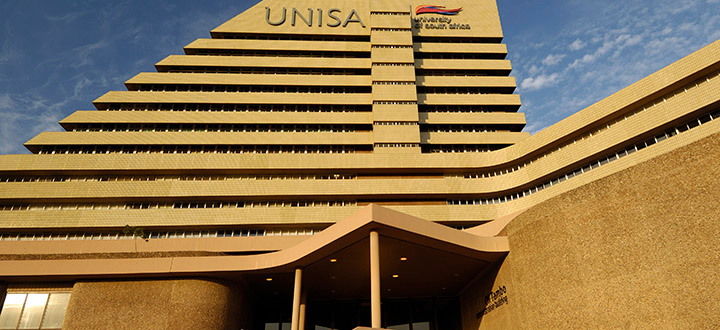 Unisa remains anchored among the waves
Unisa remains anchored among the waves
 Inhlanyelo Hub explores sustainable tourism initiatives in Marico Biosphere Reserve
Inhlanyelo Hub explores sustainable tourism initiatives in Marico Biosphere Reserve
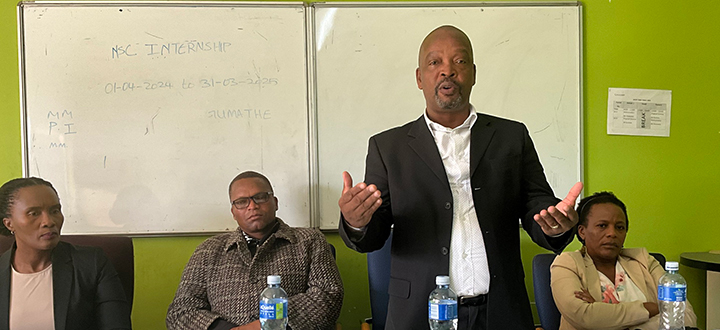 Unisa KZN Region explores extending university services to KwaMpungose community
Unisa KZN Region explores extending university services to KwaMpungose community